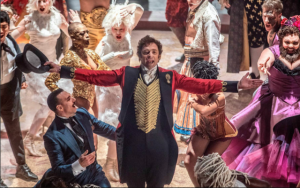THE GREATEST SHOWMAN: 3 STARS. “every number is a showstopper.”
 If Wolverine had been around in the 1840s P.T. Barnum would have made him a star. As “The Greatest Showman” tells us, the inventor of the modern circus sought out “unique persons and curiosities” to build a show that lasted for 143 years. After nine movies as the cigar-smoking X-Man Hugh Jackman now dons the ringmaster’s trademarked top hat to tell the tale of an American institution.
If Wolverine had been around in the 1840s P.T. Barnum would have made him a star. As “The Greatest Showman” tells us, the inventor of the modern circus sought out “unique persons and curiosities” to build a show that lasted for 143 years. After nine movies as the cigar-smoking X-Man Hugh Jackman now dons the ringmaster’s trademarked top hat to tell the tale of an American institution.
We first meet the future impresario as the young son of an impoverished tailor. When he makes the daughter of one of his father’s rich patrons laugh, it is love at first sight. Cut to a song or two and many years later, Barnum (now played by Jackman) is grown up with a head full of dreams, a houseful of children and a happy marriage to his childhood sweetheart Charity (Michelle Williams). What he doesn’t have is a viable career.
Fired from a job as an accountant, he packs up his desk, taking his ledger, pens and a packet of worthless deeds to sunken ships. Using those certificates he secures a $10,000 loan to start his first business, The Barnum Museum, complete with wax sculptures, stuffed animals and a thief-turned-magician named O’Malley. “People are fascinated by the exotic and the macabre,” he says.
He has trouble selling tickets until his daughters make a suggestion. “You need something sensational,” they say, “like a mermaid or unicorn. Something alive, not stuffed.” He doesn’t round up any mermaids or unicorns but does assemble a bearded lady (Keala Settle), trapeze artists (Zendaya and Yahya Abdul-Mateen II), tattooed men, Dog-faced boys, Irish giants (Radu Spinghel) and Siamese twins.
Critic James Gordon Bennett (Paul Sparks), denounces the show as exploitation. “It’s a circus,” he raves. “The word you used to describe my show has a nice ring to it,” says Barnum and the concept of the contemporary circus was born.
Money poured in but respect did not. “My father was treated like dirt,” says the so-called “purveyor of the obscene and indecent.” “I was treated like dirt. My daughters won’t be treated like dirt.” In an attempt to court a more upscale crowd he brings on socialite and actor Phillip Carlyle (Zac Efron). Carlyle, when he isn’t pining for acrobat Anne Wheeler (Zendaya), sets up shows for Queen Victoria and introduces Barnum to opera singer Jenny Lind (Rebecca Ferguson). Dubbed the Swedish Nightingale, she is the biggest singing star in Europe, and Barnum almost goes bankrupt trying to make her a sensation in America.
It isn’t until he rediscovers his roots—and the virtues of performing under a tent—that he makes a lasting impression.
“The Greatest Showman” is a period piece but pulsates with the rhythms of contemporary music. Songwriters Benj Pasek and Justin Paul, who took home as Oscar last year for their work on “La La Land,” provide a timeless score that rings with the brassiness of present-day Broadway. It feels slightly strange, although no more strange than people suddenly bursting into song while traipsing down the street. The songs are catchy and the loose-limbed contemporary choreography would likely have caused riots in 1845.
As the flamboyant huckster who craves legitimacy Jackman returns to his musical theatre roots, handing in a performance that wouldn’t be out of place on the Broadway stage. The flimsy-ish story doesn’t give him much opportunity to really dig deep into what made Barnum tick. The genial actor, however, in a bigger-than-life performance, brings the rags to riches tale if not to vivid life, at last to tuneful life.
More interesting is the film’s subtext. It’s an American success story writ large but beyond that are comments on equality and bigorty. Despite advertising his menagerie of performers as a freak show we’re told Barnum saw his circus as a celebration of humanity in all its forms. The movie favours uplift and inspiration over deep insight, but its harmonious pop psychology will make your feet tap.
The message of tolerance is central to the plot, reinforced by the Carlyle, Wheeler romance. The upper crust actor and the African American acrobat are drawn to one another despite societal the norms of the day. When his father scolds him, reminding him to remember his place he snaps back, “If this is my place I don’t want it.” As Barnum reaches for the gold, turning his back on his family and ‘freaks,’ Carlyle walks away from his privilege, following his heart.
With that in mind it’s a shame that the move doesn’t give its marginal characters more of a voice. The Bearded Lady, the Dog Faced Boy and others are more or less treated on film as Barnum treated them in life, as set dressing and not much more.
“The Greatest Showman” seems to have taken its lead from its subject and delivered a movie in which every number is a showstopper. It’s a rollercoaster of story and music that occasionally moves too fast but delivers enough thrills along the way to be worth the price of admission. Maybe that’s enough. As Barnum himself said, “The noblest art is that of making others happy.”
